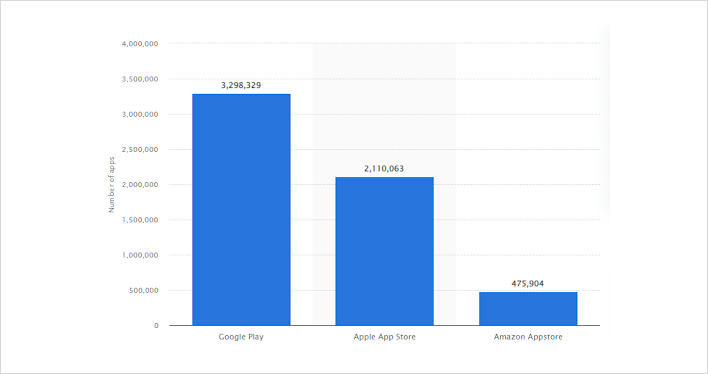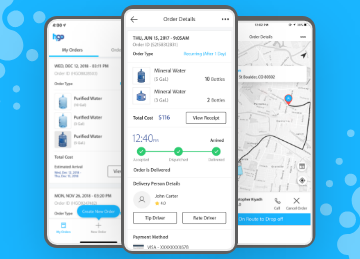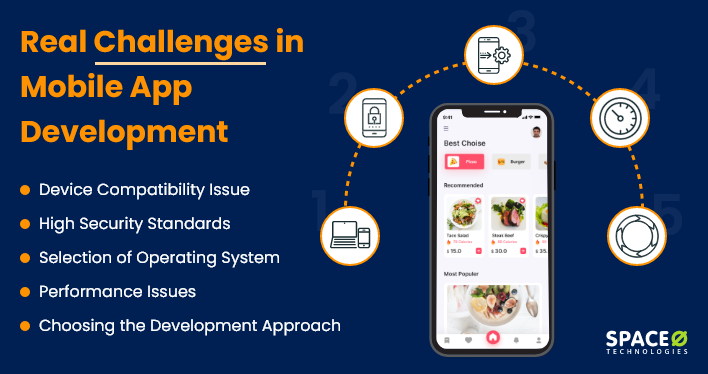Mobile apps have always been a synonym for comfort. Where in just a few clicks, you efficiently perform a simple as well as a complex task. Therefore, it has been observed enormous excitement in recent years for mobile applications.
According to the report of Statista, Google Play Store has more than 3.3 million Android apps, and Apple App Store has over 2.11 million iOS apps. And this number is inevitably going to increase every day.

Source: Statista
To build top-notch mobile applications that are up to date with the current trends, you need to consult an experienced mobile app development company. However, you also require to understand the mobile app development process steps. Even after understanding the process, you need to overcome a lot of obstacles before you actually develop a successful mobile app.
So what are those real challenges in mobile app development? Let’s find out.
Table of Contents
9 Top Mobile App Development Challenges
Face the fact. It is not a cup of tea to build an app that gives a competitive edge to help you lead in the industry. Mobile app developers really strive hard to deliver an app that matches exactly your expectations.
However, an app developer faces challenges too while developing mobile apps. Therefore, in this section, we will understand of the main challenges developers face when they create an application from scratch. Along with the challenges, we have also discussed their solutions. So, let’s dive in.
Device Compatibility and Display Dimensions
Every apprenuer wants to make the first impression on end-users through their app. Therefore, compatibility is one of the significant factors that most app developers should focus on while developing an app.
If the app is not compatible with popular devices or screen sizes, then it could deteriorate the user experience. This is the reason why mobile app testing against different mobile devices and screen sizes is one of the toughest challenges for developers.
You should know that Android and iOS both have distinct mobile app development procedures, user interface/user experience features, and frameworks. So you must study your target audience before starting the mobile development process.
Also, ensure that your app works seamlessly on a smartphone, tablet, and other mobile devices which have different features of screen resolutions, sizes, and pixel densities.
Choosing the Operating System
There are multiple platforms, but Android and iOS are two major mobile app development platforms. Android and iOS both work differently and have distinct development procedures. Apart from this, both the mobile operating systems have different target audiences too. You may find challenges in Android app development or while developing iOS apps as well. To avoid those challenges, you need to know good app design practices and understand which platform to choose before you begin to code the application.
Generally, mobile developers leave this decision for later and waste a lot of time in designing and coding the app. Therefore, the best advice is to choose an operating system right at the beginning and develop the objects and patterns accordingly.
Choosing the Best Development Approach
The real challenge comes when developers can not decide on a mobile application development approach in the early stages. Whether you want native development or hybrid app development, it is essential to choose one development approach before you begin to build the app.
The reason being both approaches need different tech stacks and proficiencies. So, let’s discuss both approaches for you to clarify doubts related to native and cross-platform app development.
Native App Development
Native apps are operated on specific mobile app platforms such as either Android or iOS. You develop a native app using the right mobile app development tools specific to the operating system that you are choosing. Generally, native apps perform better and are safe and more reliable than cross-platform apps.
Cross-platform App Development
As the name suggests, hybrid apps run seamlessly on various platforms such as Android, iOS, and Windows. If you are planning to build a cross-platform app, ensure you choose the right tech stack that helps you develop a high-quality cross-platform app. Check out this article on difference between native and cross platform app development to find out which technology is best to use for your project.
Want to Build a Native App?
Our mobile app developers have vast experience working with native, such as Swift, Objective-C, and Java.

High Cybersecurity Standards
An enterprise app typically involves a lot of data that needs to be protected. Therefore, protecting assets becomes a top priority whenever a developer starts developing an enterprise app.
Nowadays, cyberattacks are common and have caused many problems for businesses. Therefore, mobile app developers need to consider various app security guidelines to stay protected against mobile security issues during the app development process.
- Back-up data systems in place
- Encryption of data using VPN and other channels
- Advanced anti-malware software built-in
- Secured network equipment
- Version control systems
Integration With Other Systems
Building an app for enterprise or mid-size businesses requires integrating various systems to optimize the performance of the app and streamline business operations. This also helps businesses share a wide range of data and connect a variety of on-premise and cloud apps.
To avoid issues later on, developers need to consider possible integrations beforehand. This will help you save enough time and money and focus on the essential part of mobile app development.
Choosing Development Technology
Choosing the right tech stack is not an easy task. Being the owner of the app, you must not want to waste time by selecting an inadequate technology. Developers must have a strong understanding of technologies to build an app.
Also, mobile app developers should have the clarity to build a native, hybrid, or cross-platform application. The right choice of technology will help mobile users get access to an adaptable and versatile app. Therefore, choosing the right development technology is essential.
Using the latest mobile app technologies, our client wanted to develop an app using advanced features which allow users seamlessly manage their water delivery business. After discussing complete requirements, we built a fully functional water delivery app solution for our client. Check more information in the following table.
Battery Consumption and Performance
It has been identified several times that an app consumes a lot of battery charge that compromises performance in the long run. Both these factors are very crucial to deciding on building successful apps.
All you can do is create beta versions and get them tested until you find the smooth performance of your app without causing battery issues. You will get to notice these issues while testing the app if they occur. So ensure you are vigilant and careful while the QA team is performing app testing.
Finance Management & Funding
You have a great app idea. However, it is not enough to build an app. You need to find a reliable mobile app development company that fits your budget. But what if you don’t have a budget to hire a dedicated developer or an app development company to transform your idea into reality?
You need to think about the cost of app development. Also, the cost will vary depending on your requirements, the complexity of the app, UX/UI design, and usage of the third-party APIs. Generally, developing an app can cost you between $10,000 to $2,50,000. Therefore, you need to consider all these factors before getting into mobile app development.
This is one of the biggest problems that occur in mobile app development. In such cases, you can choose to get funding from various sources, such as angel investors, loans, or joint ventures.
Looking for the Best Mobile App Development Services?
Contact us with your requirements. Space-O is a leading mobile app development company in the USA that has experience building more than 4400 apps.
Finding the Easiest Solutions
Whenever you work on any complex mobile app project, you will find it difficult to go ahead at some point in time because something might not go according to your plan. It could be anything from integrating APIs to unexpected technical difficulties, or maybe adding new functionality can go wrong.
In such a scenario, it is better to reach out to the mobile development community and find relevant solutions that can actually help you resolve all challenges. Maybe you can discuss with the API support team to find solutions or devise new strategies to integrate advanced features and functionalities in your app.
Find the actual cause of the issues. Later, you can also brainstorm ideas with your app development team structure and think together to find the best solution for fixing the problem.

H2GO – Water Delivery App Solution
H2GO is mobile app solution developed to streamline water delivery business of our client. Currently having 1000+ users, this mobile app solution works seamlessly in Android and iOS devices. Users can place order at their convenience using this app.
Now, you know the challenges in mobile application development. By applying the above-listed steps, you can reduce these challenges. It will help you avoid challenges while developing your own app. Going ahead, let’s discuss some mostly asked questions related to the challenges and mobile app development.
FAQs About Challenges in Mobile App Development
Which are the top app designing challenges?
The following list includes the major app design challenges.
- Design Compatibility Issues: To resolve this issue, you can perform compatibility testing to ensure your app is working seamlessly on all related devices and platforms.
- Complicating The User Interface: Try to simplify the user interface and ensure you add only the required features to help your app users easily navigate the mobile app.
- Design Inconsistencies: To ensure that designs are well-consisted, you need to take other design elements from your brand and utilize them in your app.
- Product Display Issues: You can use CMS platforms like Shopify and Drupal to help you transition your eCommerce site to the app without worrying about any product display issues.
Where to find a mobile application development company?
You can find the best mobile app developers from the following list.
- Space-O
- Upwork
- Clutch
- GoodFirms
- Toptal
What is the testing challenge in mobile app development?
There is a wide variety of devices available for Android and iOS, which have different custom settings to function differently.
This becomes extremely challenging for the developers to cover all existing devices.
Testers really need to be ready for some bugs to appear. However, testing challenges can be fixed with proficiency and tech stacks.
Wrapping Up
Now you have a clear idea about the real mobile app development challenges. We have discussed them along with their solutions to help you build a successful mobile application by overcoming all the discussed challenges.
If you are looking for the best mobile app development services to build an app, get in touch with us to discuss your requirements. Space-O has a team of more than 200 mobile app developers who have hands-on experience with various trending technologies and have served more than 1200 clients across the globe.
Once you contact us, our tech professional will get in touch with you to discuss your requirements and help you devise a mobile app development plan




